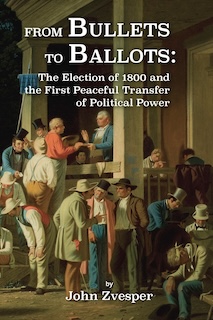The polls and pundits say this presidential election will be a close one, perhaps decided by a few thousand voters in a handful of states. Both the pollsters and pundits may be wrong, of course, but in case they are right, we might recall our first contested presidential election, the one that occurred in 1800.
The first thing to recall about that election is that in 1800 the American people did something no people had done before. They carried out a peaceful transfer of contested political power with a democratic election. For almost a decade prior to this unprecedented event, Republicans and Federalists had waged a bitter partisan contest that split Americans into hostile factions and destroyed personal friendships. Each faction accused the other of treachery and treason. Newspapers and pamphlets spread falsehoods and slanders, not sparing even President George Washington. At one point during the decade, threatening partisan crowds gathered outside Washington’s home in Philadelphia. As the election approached, the Federalists, the party in control of the federal government, passed laws that limited free speech. Editors were thrown in jail. After the election, some partisans claimed the election was invalid, while others sought to change the procedures by which the votes, including electoral college votes, would be counted. Two states even put their militia on alert, as partisans talked of a resort to force.
Before the adoption of the 12th Amendment (1804), electors in the Electoral College cast votes for candidates without regard to whether they were voting for the candidate as president or vice-president. The candidate with the most votes was elected president, while the second-highest vote-getter was elected vice president. While the Republicans proposed Thomas Jefferson for president, and Aaron Burr for vice president, they failed to arrange for at least one of their electors to discard his second vote. As a result, Burr ended up tied in the Electoral College with Jefferson. As the Constitution provided, the election went to the House of Representatives. After many ballots, the House finally decided in Jefferson’s favor. This happened because Alexander Hamilton, the leader of the Federalists, supported Jefferson rather than Burr. Hamilton was strongly opposed to Jefferson’s political principles, but he believed that Burr had no principles at all. Hamilton thought that self-government would survive under Jefferson, and the Federalists would have another day. He was only half right, as it turned out. Self-government did survive, but Jefferson’s manner of governing, a growing and changing America, and the obstinacy of many Federalists put an end to the Federalist party.

Despite all the contention and difficulties, on March 4, 1801, Thomas Jefferson peacefully assumed the duties of president, as prescribed by law. Self-government had proved itself—as it would have to do again and again.
The story of the election of 1800 is told in John Zvesper’s From Bullets to Ballots: The Election of 1800 and the First Peaceful Transfer of Political Power. It is the best short—perhaps simply the best—account we have of these events. It is available in the tah.org bookstore as a paperback or as a free download.
Zvesper’s book explains why the peaceful transfer of power occurred, despite all the partisan acrimony—and worse—of the decade that preceded it. To do this, Zvesper recounts the political history of the 1790s with admirable clarity and concision. He not only relates the events that unfolded, but also analyzes the principles and political calculations of Jefferson, Madison and Hamilton. Central to the history Zvesper relates is the emergence of the first political parties. As he tells the story, Zvesper explains the necessity of parties, their advantages and disadvantages, and their relation to public opinion. The topic of public opinion leads Zvesper into an insightful discussion of the rhetoric and actions of the key political figures of the day. This discussion in turn brings the reader to a deeper understanding of principled partisanship and its limitations, in light of the foundational principles of American politics announced in the Declaration of Independence. Zvesper’s account is enlivened with telling anecdotes and quotations. Behind his striking command of the historical materials, however, is a firm grasp of the profound significance of the election of 1800, and what it means for the possibility of self-government today. The election set a precedent for the peaceful transfer of power so authoritative that it has been broken only twice in our history, after the elections of 1860 and 2020.

What lessons can we draw from this story? We mention three. Self-government survived the contention of the 1790s and the complications and uncertainties of the election of 1800 because of the intelligence and character of the leading politicians of the day, principally Jefferson and Hamilton. (Burr was intelligent, but a scoundrel.) In addition, many who were involved in the drama of 1800 had been active in 1776 and after, and were proud of the achievement of self-government. They understood the sacrifices it required and did not take it for granted.
As we know, we are not always fortunate to have politicians of such intelligence and character involved in our presidential elections. So, the second lesson is just as important. In 1800, our institutions and electoral mechanisms were new and untried. Now, they are well established and have been adjusted as our experience has suggested they should be. Most recently, for example, Congress modified the Electoral Vote Count Act to make a repeat of 2020 less likely.
Ultimately, of course, in a fitting tribute to self-government, on election day and after, the survival of self-government will depend on thousands of Americans, elected and unelected, who faithfully execute their duties. From secretaries of state to ballot counters, from faithful electors to congressional clerks, from election day to the certification of each state’s electoral votes, these Americans will carry on our tradition of free and fair presidential elections.

